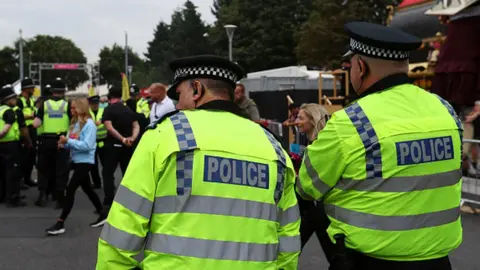Power struggle over who should watch over police in England and Wales
 Getty Images
Getty ImagesThe number of elected regional mayors has grown in recent years, but the role of police and crime commissioners (PCCs) has remained relatively obscure.
And now there are signs that PCCs are gradually being phased out.
Rishi Sunak's government wants to create more elected mayors - but is keen for them to take over, rather than run alongside, the role of PCCs.
This matters because policing has never been under more scrutiny and public confidence in some forces is at rock bottom.
Although PCCs do not have operational control over local forces - they are watchdogs rather than "police chiefs" - the hiring and firing of chief constables is among their powers.
Some mayors would quite like those powers for themselves and may seek a mandate to take them when they're next up for election.
The next PCC and mayoral elections are due in 2024, and there is already a power struggle over who should have the job of holding the police to account.
One Labour PCC has accused the Conservative mayor of the West Midlands of plotting a "hostile takeover"; while other PCCs fear their role will be weakened if it is taken over by mayors, leaving a messy political landscape of overlapping local leaders vying for control of policing.
Transfer of duties
Originally, PCCs were David Cameron's big idea, to bring US-style local democracy to England and Wales. They replaced police authorities - committees of councillors and other local figures - in 2012, under a law passed by the Conservative-Liberal Democrat coalition government.
The first PCC elections were billed as the biggest shake-up of policing for decades, but the turnout was the lowest nationally in the UK's peacetime history.
Criticism has followed since, with opposition parties complaining about the leadership of police forces by PCCs and calling for them to be scrapped.
Then, in a policy paper last year, the government stated its preference for "mayoral control of Police and Crime Commissioner functions where boundaries align".
Since then, a draft law that would allow mayors to take control of PCC duties without the consent of councils in their area has been making its way through Parliament.
A government spokesperson said the transfer of PCC duties to mayors "will not always be a suitable option, and mayors are only able to exercise PCC functions if they have been elected to do so".
 Getty Images
Getty ImagesPCC powers are already held by the mayors of London, Greater Manchester and West Yorkshire, while other mayors have stated their intention to acquire them.
Mayors can appoint an unelected deputy for crime and policing to do the job on their behalf, as those in Greater Manchester and West Yorkshire have done.
Marc Jones, who is the Conservative PCC for Lincolnshire, said the main strength of his role "is the directly elected element".
He said he's worried about the consequences of more hand-picked deputy mayors making "decisions around community policing and safety one step removed from the person who's elected".
"I'm still nervous about where that might end up," said Mr Jones, who took office in 2016 and was re-elected in 2021 with a 57.9% majority.
But some PCCs have already been given their marching orders by mayors.
Power struggle
When Alan Billings's current term as South Yorkshire PCC ends in 2024, his role will be wound up.
In office since 2014, the Labour PCC had already decided to stand down before the new mayor of South Yorkshire, Oliver Coppard, announced he would absorb his responsibilities.
The PCC role "is being diluted now with elected mayors", Mr Billings said.
Despite his unease, Mr Billings has said he would work with Mr Coppard, if the Labour mayor wished to take on his PCC duties.
An amicable handover from one Labour politician to another seems possible, whereas other PCC-mayor relationships are not so harmonious.
In the West Midlands, there's a bitter feud between the region's Labour PCC, Simon Foster, and its Conservative mayor, Andy Street, over policing powers.
Proposals to transfer policing oversight to the mayor were supported by a majority of respondents to a public consultation in 2019.
To the fury of Mr Foster, the government is now backing mayors who want to abolish the PCC in their area.
"Make no mistake, this is not an evolution or a merger," Mr Foster said. "It is profoundly undemocratic, it is deeply divisive, and it is nothing more than a proposed hostile takeover."
Mr Street did not wish to comment.
 Getty Images
Getty ImagesUnlike Mr Street, the new mayor of the North East won't have the option to disband any PCCs when they're elected next year. That's because the mayoral boundaries do not align with those of police forces in the area.
That takes the heat out of a political hot potato for Kim McGuinness, who is running to be the mayor of the North East for Labour, but currently serves as the PCC for Northumbria.
Even though she does "support a model of running the two things together where it's possible", she doesn't think we're heading towards the abolishment of PCCs.
"We've been instrumental in the national conversation about violence against women and girls and sexual violence," she said.
Her party has not always seen the value of PCCs.
Political shift
Back in 2014, when Ed Miliband was Labour leader, the party said the model was "fundamentally flawed" and "costing too much".
Now a Labour source said the party currently has no plans to make changes to PCCs.
The Liberal Democrats have been on a similarly sinuous journey with PCC policy.
When they were in government with the Conservatives, Liberal Democrat cabinet ministers - including current party leader Sir Ed Davey - backed the law that introduced PCCs.
But by 2014, the party turned against PCCs, branding them a failure. Almost a decade on, the party is renewing its call for PCCs to be abolished, saying they would replace them with local police boards made up of councillors and spend their funding on new community support officers.
"When most crimes in this country are going unsolved, it is the biggest waste of money to be funding their pointless roles," Sir Ed said.
With no costings for the party's policy, it's not possible to know if scrapping PCCs would save money or not.
One of the strengths of PCCs, says Joy Allen, the Labour PCC for County Durham, "is their ability to secure vital extra funding to support their safety goals".
"These grants amount to millions of pounds each year and include funding to deliver critical support services for victims of crime including those impacted by domestic abuse and sexual violence."
PCCs, she says, "play a critical role in reducing crime and reoffending in their communities".
With PCCs up for election again next year, voters will be the judge of that.
